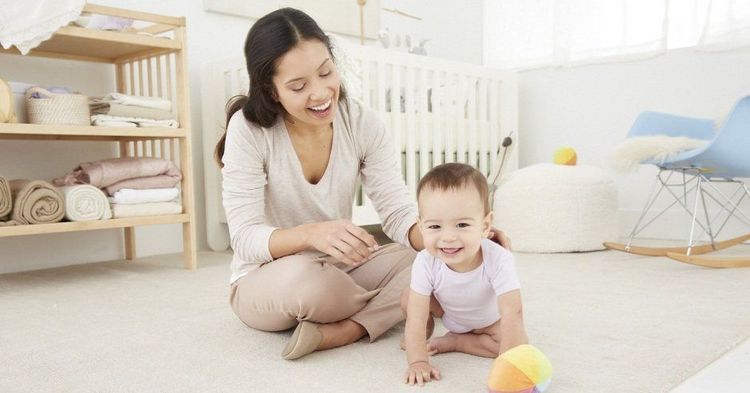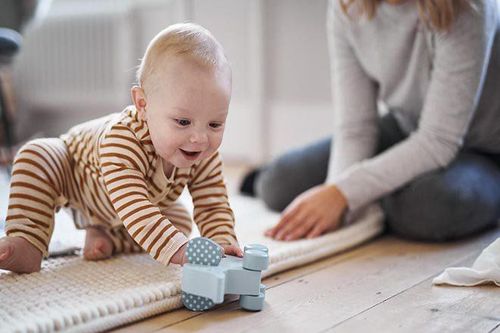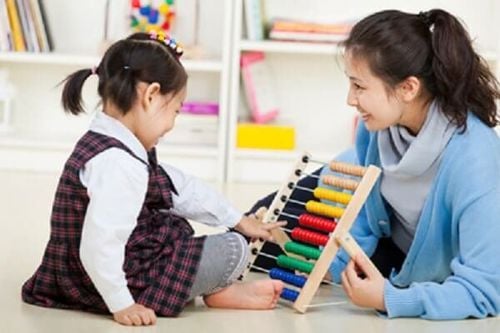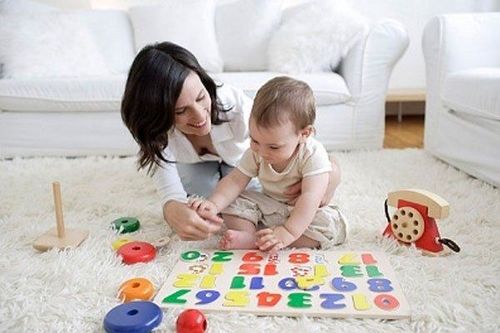This is an automatically translated article.
Taking care of children also includes learning and playing with them. The interaction from adults, especially parents, will help children feel affection. So what methods should you implement to help your child learn while playing while promoting skill and intellectual development?
1. Play with your baby in the first month
Spending time playing with children is one of the methods of educating children that everyone needs to pay attention to. Today, medicine has proven that a child's development is the result of a long process. If parents know how to play or study with their children, when they grow up, their children will be more confident and have higher intelligence.
During the first month of infancy, the baby's eyes are developing. Children's eyes are not yet mature, so they will only see objects with color and only see shapes, but not see details of everything around them. For your child's peace of mind, hold your child and talk to him so he can hear familiar sounds and feel the warmth of your parents' affection.
2. When the baby turns 2nd month
Through the first month, babies have begun to adapt to their surroundings and have interactive actions again. You can sing to your child, perform some actions such as clapping to help them develop their senses, especially vision.
From this point on, children will remember and learn from what their loved ones do with them. If adults take the time to talk and interact, children will develop language and quick hand and eye reflexes.
When the baby is a little older, he will begin to know how to capture the emotions and gestures of people around. When the child is a little older, the imitation actions will be obvious to you.

Ba mẹ có thể chơi cùng trẻ 2 tháng tuổi bằng cách hát cho trẻ nghe
3. 3 month old baby
By the third month, most babies will learn to roll and play with some toys. At this time, the baby's ability to learn and imitate will be more noticeable. At the same time, the baby will change some irritable personality when it is not as expected. So you should pay attention and encourage your child to calmly handle each problem.
From 3 months, you should start letting your baby grasp objects. At this time, the baby cannot hold firmly and is easy to fall, but practicing grasping will help the baby's hands and nervous system develop better. Let your baby play with toys with colors and sounds for him to feel.
Baby will enjoy the toys that emit sound and light. At the same time, your baby will combine learning to flip and roll at this stage to develop muscles and bones. Parents can encourage their children to lie on their stomachs so that they can both feel the toys and learn to roll.
4. 4 month old baby
After going through 3 months of pregnancy, your baby has developed quite fully. At this time, the baby's weight may double at birth or more. At the same time, the baby begins to babble and make sounds to call as well as ask relatives for help. Learning with your child at this time begins to make significant progress.
You can see that babies entering the 4th month begin to know how to express their feelings more clearly. When happy, the baby will laugh out loud, when sad, he can sit and stare. When he is not satisfied with anything around him, he will cry and get angry.
Children's grasping ability is stronger than before, they will be able to hold objects that fit the palm of their hand. At the same time, the baby is sad when tickled. This reflex is a milestone marking the development of the baby because in the first 3 months of tickling the baby, there is no reflex.
5. 5 month old baby
Entering the 5th month, the baby's visual ability begins to develop more clearly. Sight and hearing begin to become more active. Your baby will babble some basic easy-to-speak sounds like “a” , “e”.....
At this point you should show your baby some consonants or vowels so that they can learn to read. At the same time, point and say the names of objects so that your baby can remember and identify each item. Your baby will repeat the imitation, so you need to spend time teaching him to say the words he has learned.
6. 6 month old baby
6 months of age is a milestone that assesses the development of a baby after infancy. At this time, children begin to learn to sit and change their eating habits. From drinking breast milk exclusively, babies begin to learn weaning.
At this time, the baby can crawl to get the item he needs. You should leave toys on the floor to encourage your baby to be more active. In the early stages of life, when the baby is hard working, the musculoskeletal system will develop strongly to help the baby quickly learn to stand and walk.
Your baby's toys should be large enough to fit in your hand and limit the risk of your baby putting them in his or her mouth. Moreover, you should not let your baby play out of sight to avoid falling or dangerous accidents to the head.

Chăm sóc con khi con 6 tháng tuổi với giai đoạn tập ngồi
7. 7 month old baby
After 6 months, the babies have perfected many basic skills. By the 7th month, babies' grasping of objects is almost mature and less likely to fall. In the following months, your baby will have many actions to increase the sense of hands.
In order for children to get used to and develop the nerves connecting their hands, you should let them hold toys of various sizes. It is dangerous to let children hold small objects without parental supervision. Pay attention to your child to avoid swallowing toys when he accidentally puts them in his mouth.
A spoon or rattle can be an easy object for your baby to hold. Their shape also helps the baby's hand-holding ability to be more exercised. One way to help your baby practice his hands is to play with grass. Your baby will first feel the touch and then grab and pull them. These actions will increase creativity and feeling for the hands later.
8. 8 month old baby
At this stage, the baby has crawled quite quickly and always keeps an eye on any object in sight. Try to tidy up your baby's play space. Note that children should only hold toys to avoid letting them play with dangerous objects in the house such as knives, scissors....
Some children pay attention to kitchen utensils, you can also choose baskets, pots and pans. suitable for children to get used to. In the process of playing with your child, do not forget to ask questions about the names of objects or body parts. At this time, you can learn with your child some knowledge about object names.
Helping your baby to recognize the names of objects or body parts will be good for the baby's activities. Later, when children can talk, they will not be surprised because they do not know how to name objects.
9. 9 month old baby
Entering the 9th month, the baby has been acquainted and knows more items. The child's curiosity is growing, he will be able to discover many objects placed in the house. They have begun to learn how to open the cabinets in the house. To ensure the safety of children during this period, you should lock cabinets that contain potentially dangerous items.
9 months old is the time when babies can listen to stories or read stories with pictures. However, at a young age there is a tendency to tear or throw books, so most books for this age are made of cloth or hardcover. Baby's exploration of doors is also a way to develop vision and sense of hands.
Curiosity with everything around increases as the baby grows. Especially the dangerous items the baby wants to explore more and more. Always show and remind your child which items are dangerous and which can be played to protect them from accidental accidents.

Chơi cùng con khi con 9 tháng tuổi với việc khám phá nhiều đồ vật
10. When the baby is 10 months old
Usually at 10 months we will see the baby take its first steps. But it is not 100% that some babies will be slower but most of them can stand and lift one leg by the 10th month.
Children's eyes and senses are fully developed to function. You should teach your child how to find a lost object at this stage. Finding things will help your child be more agile and use their eyes and reasoning better. However, attention is a factor to consider. Children are easily distracted, you need to choose attractive items so that they are easy to find and feel the need to find them.
11. When the baby is 11 months old
The 11th month is the time when the basic skills are almost completely different. However, language ability may be completed later depending on the condition and development ability of each child. In general, training children to play games or practice singing will be popular at this stage.
By November, your baby will enjoy being taught to say single words. You can speak slowly for your baby to hear then he will make sounds by mimicking. Some families, due to being too busy, have chosen a teaching program or let their children watch cartoons to interact with the characters.
According to opinions and advice from experts, too early exposure to TV or smart devices will affect brain development. Smart devices have a gravitational pull that makes children easily addicted to forgetting the main purpose of interacting with the character in the clip.
12. Children's 1-year-old milestone
Entering the 12th month, the child is about to turn 1 year old and experiences many things in the first year of life. Some babies may already be able to say single words at this stage. Maybe your baby will imitate the words adults tell them. Some are already walking and some can only crawl.
Most babies develop according to their milestones in life. Only a very small number are developing earlier or later than the forecasted periods.
You can track your child's growth through the weight index to compare with the standard that balances nutrition. In case the child reaches the age and has abnormal symptoms along with speech delay or delay or both speech delay and delay, you need to take your child to see a doctor.
Today, under the advancement of medicine, mothers have been playing with their children since the baby was still in the womb. That is called thai religion. Children will be trained early reflexes to help stimulate nerve development. After birth, at each stage, parents will also learn and give their children access to optimal educational methods.
No matter what age the child is, the parent's way of taking care of the child also plays an important role. Take time to play with your child or teach him to learn so that he feels loved and has many opportunities for intellectual development.
Please dial HOTLINE for more information or register for an appointment HERE. Download MyVinmec app to make appointments faster and to manage your bookings easily.













